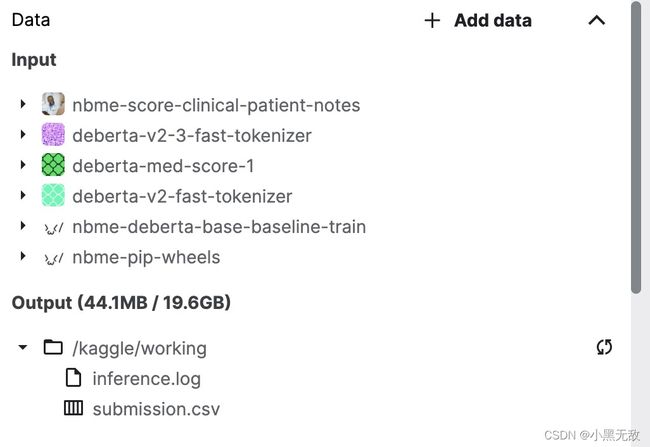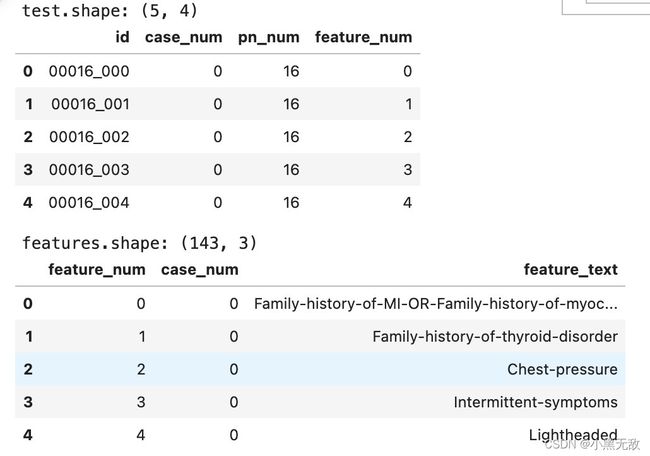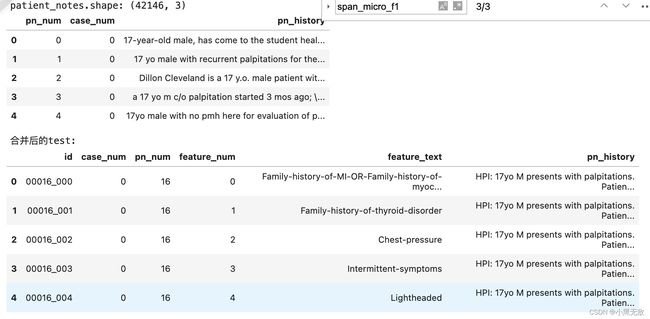小黑大口啃初版baseline:Score Clinical Patient Notes提交部分代码
目录
-
- 数据目录:
- 1.将fasttokenizer导入transformers库里面
- 2.config类定义
- 3.导包
- 4.加载tokenizer
- 5.评价指标
- 6.转换函数
- 7.utils包
- 8.数据读取
- 9.超参数阈值选择
- 10.合并数据集
- 11.dataset设置
- 12.model设置
- 13.推断函数
- 14.model测试
- 15.提交
数据目录:
1.将fasttokenizer导入transformers库里面
import shutil
from pathlib import Path
# transformers库的位置
transformers_path = Path('/opt/conda/lib/python3.7/site-packages/transformers')
# tokenizer的文件夹位置
input_dir = Path('../input/deberta-v2-3-fast-tokenizer')
# tokenizer文件的位置
convert_file = input_dir / 'convert_slow_tokenizer.py'
# convert_tokenizer将要移动到transformers库里的路径
conversion_path = transformers_path/convert_file.name
# 如果存在这个同名文件,则删除它
if conversion_path.exists():
conversion_path.unlink()
# 将convert_tokenizer文件拷贝到transformers库里面
print('将',convert_file,'移动到',transformers_path,'.....')
shutil.copy(convert_file,transformers_path)
# 开始将deberta模型的tokenizer文件移动到transformers.models.deverta_v2库里面
deberta_v2_path = transformers_path / 'models' / 'deberta_v2'
for filename in ['tokenization_deberta_v2.py','tokenization_deberta_v2_fast.py']:
file_path = deberta_v2_path/filename
if file_path.exists():
file_path.unlink()
shutil.copy(input_dir/filename,file_path)
2.config类定义
# config类的定义
class CFG:
num_workers = 4
path = '../input/deberta-med-score-1'
config_path = path + '/config.pth'
model = 'microsoft/deberta-v3-large'
batch_size = 32
fc_dropout = 0.2
max_len = 354
seed = 42
n_fold = 5
trn_fold = [0,1,2,3,4]
3.导包
# 库的导入
import os
import gc
import ast
import re
import sys
import copy
import json
import time
import math
import string
import pickle
import random
import joblib
import itertools
import warnings
warnings.filterwarnings('ignore')
import scipy as sp
import numpy as np
import pandas as pd
pd.set_option('display.max_rows',500)
pd.set_option('display.max_columns',500)
from tqdm.auto import tqdm
from sklearn.metrics import f1_score
from sklearn.model_selection import StratifiedKFold,GroupKFold,KFold
import torch
import torch.nn as nn
from torch.nn import Parameter
import torch.nn.functional as F
from torch.optim import Adam,SGD,AdamW
from torch.utils.data import DataLoader,Dataset
import tokenizers
import transformers
print(f'tokenizers.__version__:{tokenizers.__version__}')
print(f'transformers.__version__:{transformers.__version__}')
from transformers import AutoTokenizer,AutoModel,AutoConfig
from transformers import get_linear_schedule_with_warmup,get_cosine_schedule_with_warmup
%env TOKENIZERS_PARALLELISM = true
device = torch.device('cuda' if torch.cuda.is_available() else 'cpu')
4.加载tokenizer
# 加载tokenizer
from transformers.models.deberta_v2.tokenization_deberta_v2_fast import DebertaV2TokenizerFast
tokenizer = DebertaV2TokenizerFast.from_pretrained('../input/deberta-v2-fast-tokenizer')
CFG.tokenizer = tokenizer
%env TOKENIZERS_PARALLELISM=true
text = 'I love you!'
tokenizer(text,text,add_special_tokens = True,return_offsets_mapping = True)
{‘input_ids’: [1, 273, 472, 274, 300, 2, 273, 472, 274, 300, 2], ‘token_type_ids’: [0, 0, 0, 0, 0, 0, 1, 1, 1, 1, 1], ‘attention_mask’: [1, 1, 1, 1, 1, 1, 1, 1, 1, 1, 1], ‘offset_mapping’: [(0, 0), (0, 1), (1, 6), (6, 10), (10, 11), (0, 0), (0, 1), (1, 6), (6, 10), (10, 11), (0, 0)]}
5.评价指标
# 评价指标F1
def micro_f1(preds,truths):
# 微观F1
preds = np.concatenate(preds)
truths = np.concatenate(truths)
return f1_score(truths,preds)
def span_micro_f1(preds,truths):
bin_preds = []
bin_truths = []
for pred,truth in zip(preds,truths):
if not len(pred) and not len(truth):
continue
length = max(np.max(pred) if len(pred) else 0,np.max(truth) if len(truth) else 0)
bin_preds.append(spans_to_binary(pred,length))
bin_truths.append(spans_to_binary(truth,length))
# print(bin_preds) [array([0., 1., 0., 0., 0., 0., 0., 0.])]
# print(bin_truths) [array([0., 1., 0., 1., 1., 1., 1., 1.])]
return micro_f1(bin_preds,bin_truths)
def spans_to_binary(spans,length = None):
length = np.max(spans) if length is None else length
binary = np.zeros(length)
for start,end in spans:
binary[start:end] = 1
return binary
preds = [[[1,2],[3,2]]]
truths = [[[1,2],[3,8]]]
span_micro_f1(preds,truths)
6.转换函数
# 转换为标准的形式
def create_labels_for_scoring(df):
# example: ['0 1', '3 4'] -> ['0 1; 3 4']
df['location_for_create_labels'] = [ast.literal_eval(f'[]')] * len(df)
for i in range(len(df)):
lst = df.loc[i,'location']
if lst:
new_list = ';'.join(lst)
df.loc[i,'location_for_create_labels'] = ast.literal_eval(f'[["{new_list}"]]')
# create labels
truths = []
for location_list in df['location_for_create_labels'].values:
truth = []
if len(location_list) > 0:
location = location_list[0]
for loc in [s.split() for s in location.split(';')]:
start,end = int(loc[0]),int(loc[1])
truth.append([start,end])
truths.append(truth)
return truths
# 转化成字符级别的概率
def get_char_probs(texts,predictions,tokenizer):
results = [np.zeros(len(t)) for t in texts]
for i,(text,prediction) in enumerate(zip(texts,predictions)):
encoded = tokenizer(text,add_special_tokens = True,return_offsets_mapping = True)
for idx,(offset_mapping,pred) in enumerate(zip(encoded['offset_mapping'],prediction)):
start = offset_mapping[0]
end = offset_mapping[1]
results[i][start:end] = pred
return results
# 识别连续的段
def get_results(char_probs,th = 0.5):
results = []
for char_prob in char_probs:
result = np.where(char_prob >= th)[0] + 1
# reslt:[ 85 86 87 88 89 90 91 92 93 94 95 96 97 98 99 126 127 128 129 130
# 131 132 133 134 135 136 137 138 143 144 145 146 147 148 149 150 151]
# ------->
# [[85, 86, 87, 88, 89, 90, 91, 92, 93, 94, 95, 96, 97, 98, 99],
# [126, 127, 128, 129, 130, 131, 132, 133, 134, 135, 136, 137, 138],
# [143, 144, 145, 146, 147, 148, 149, 150, 151]]
result = [list(g) for _,g in itertools.groupby(result,key = lambda n,c = itertools.count():n - next(c))]
# result:['85 99', '126 138', '143 151']
result = [f'{min(r)} {max(r)}' for r in result]
result = ';'.join(result)
results.append(result)
return results
# 切分标准形式
def get_predictions(results):
predictions = []
for result in results:
prediction = []
if result != '':
for loc in [s.split() for s in result.split(';')]:
start,end = int(loc[0]),int(loc[1])
prediction.append([start,end])
predictions.append(prediction)
return predictions
7.utils包
# utils
def get_score(y_true,y_pred):
score = span_micro_f1(y_true,y_pred)
return score
def get_logger(filename = 'inference'):
from logging import getLogger,INFO,StreamHandler,FileHandler,Formatter
logger = getLogger(__name__)
logger.setLevel(INFO)
handler1 = StreamHandler()
handler1.setFormatter(Formatter('%(message)s'))
handler2 = FileHandler(filename = f'{filename}.log')
handler2.setFormatter(Formatter('%(message)s'))
logger.addHandler(handler1)
logger.addHandler(handler2)
return logger
LOGGER = get_logger()
def seed_everything(seed = 42):
random.seed(seed)
os.environ['PYTHONHASHSEED'] = str(seed)
np.random.seed(seed)
torch.manual_seed(seed)
torch.cuda.manual_seed(seed)
torch.backends.cudnn.deterministic = True
seed_everything(seed=42)
8.数据读取
oof_0 = pd.read_pickle('../input/deberta-med-score-1'+'/oof_df_0.pkl')
oof_1 = pd.read_pickle('../input/deberta-med-score-1'+'/oof_df_1.pkl')
oof_2 = pd.read_pickle('../input/deberta-med-score-1'+'/oof_df_2.pkl')
oof_3 = pd.read_pickle('../input/deberta-med-score-1'+'/oof_df_3.pkl')
oof_4 = pd.read_pickle('../input/deberta-med-score-1'+'/oof_df_4.pkl')
oof = pd.concat([oof_0,oof_1,oof_2,oof_3,oof_4]).reset_index()
truths = create_labels_for_scoring(oof)
print('truths[:10]:',truths[:10])
char_probs = get_char_probs(oof['pn_history'].values,oof[[i for i in range(CFG.max_len)]].values,CFG.tokenizer)
9.超参数阈值选择
best_th = 0.5
best_score = 0
for th in np.arange(0.45,0.55,0.01):
th = np.round(th,2)
results = get_results(char_probs,th = th)
#print(results)
preds = get_predictions(results)
score = get_score(preds,truths)
if best_score < score:
best_th = th
best_score = score
LOGGER.info(f"th: {th} score: {score:.5f}")
LOGGER.info(f"best_th: {best_th} score: {best_score:.5f}")
10.合并数据集
test = pd.read_csv('../input/nbme-score-clinical-patient-notes/test.csv')
submission = pd.read_csv('../input/nbme-score-clinical-patient-notes/sample_submission.csv')
features = pd.read_csv('../input/nbme-score-clinical-patient-notes/features.csv')
def preprocess_features(features):
features.loc[27, 'feature_text'] = "Last-Pap-smear-1-year-ago"
return features
features = preprocess_features(features)
patient_notes = pd.read_csv('../input/nbme-score-clinical-patient-notes/patient_notes.csv')
print(f"test.shape: {test.shape}")
display(test.head())
print(f"features.shape: {features.shape}")
display(features.head())
print(f"patient_notes.shape: {patient_notes.shape}")
display(patient_notes.head())
test = test.merge(features,on = ['feature_num','case_num'],how = 'left')
test = test.merge(patient_notes,on = ['pn_num','case_num'],how = 'left')
print('合并后的test:')
display(test)
11.dataset设置
# Dataset设置
def prepare_input(cfg,text,feature_text):
inputs = cfg.tokenizer(text, feature_text,
add_special_tokens=True,
max_length=CFG.max_len,
padding="max_length",
return_offsets_mapping=False)
for k,v in inputs.items():
inputs[k] = torch.tensor(v,dtype = torch.long)
return inputs
class TestDataset(Dataset):
def __init__(self,cfg,df):
self.cfg = cfg
self.feature_texts = df['feature_text'].values
self.pn_historys = df['pn_history'].values
def __len__(self):
return len(self.feature_texts)
def __getitem__(self,item):
inputs = prepare_input(self.cfg,
self.pn_historys[item],
self.feature_texts[item]
)
return inputs
12.model设置
class CustomModel(nn.Module):
def __init__(self,cfg,config_path = None,pretrained = False):
super().__init__()
self.cfg = cfg
if config_path is None:
self.config = AutoConfig.from_pretrained(cfg.model,output_hidden_states = True)
else:
self.config = torch.load(config_path)
if pretrained:
self.model = AutoModel.from_pretrained(cfg.model,config = self.config)
else:
self.model = AutoModel.from_config(self.config)
self.fc_dropout_0 = nn.Dropout(0.1)
self.fc_dropout_1 = nn.Dropout(0.2)
self.fc_dropout_2 = nn.Dropout(0.3)
self.fc_dropout_3 = nn.Dropout(0.4)
self.fc_dropout_4 = nn.Dropout(0.5)
self.fc = nn.Linear(self.config.hidden_size,1)
self._init_weights(self.fc)
def _init_weights(self,module):
if isinstance(module,nn.Linear):
module.weight.data.normal_(mean = 0.0,std = self.config.initializer_range)
if module.bias is not None:
module.bias.data.zero_()
elif isinstance(module,nn.Embedding):
module.weight.data.normal_(mean = 0.0,std = self.config.initializer_range)
if module.padding_idx is not None:
module.weight.data[module.padding_idx].zero_()
elif isinstance(module,nn.LayerNorm):
module.bias.data.zero_()
module.weight.data.fill_(1.0)
elif isinstance(module,nn.LayerNorm):
module.bias.data.zero_()
module.weight.data.fill_(1.0)
def feature(self,inputs):
outputs = self.model(**inputs)
last_hidden_states = outputs[0]
return last_hidden_states
def forward(self,inputs):
feature = self.feature(inputs)
output_0 = self.fc(self.fc_dropout_0(feature))
output_1 = self.fc(self.fc_dropout_1(feature))
output_2 = self.fc(self.fc_dropout_2(feature))
output_3 = self.fc(self.fc_dropout_3(feature))
output_4 = self.fc(self.fc_dropout_4(feature))
output = (output_0 + output_1 + output_2 + output_3 + output_4) / 5
return output
# 测试代码
# import torch
#cfg = CFG()
# inputs = prepare_input(cfg,'I love you!','I hate you')
# for k,v in inputs.items():
# inputs[k] = v.unsqueeze(0)
# model = CustomModel(cfg)
# print(model(inputs).shape)
13.推断函数
def inference_fn(test_loader,model,device):
preds = []
model.eval()
model.to(device)
tk0 = tqdm(test_loader,total = len(test_loader))
for inputs in tk0:
for k,v in inputs.items():
inputs[k] = v.to(device)
with torch.no_grad():
y_preds = model(inputs)
preds.append(y_preds.sigmoid().to('cpu').numpy())
predictions = np.concatenate(preds)
return predictions
14.model测试
test_dataset = TestDataset(CFG,test)
test_loader = DataLoader(test_dataset,
batch_size = CFG.batch_size,
shuffle = False,
num_workers = CFG.num_workers,
pin_memory = True,
drop_last = False
)
predictions = []
for fold in CFG.trn_fold:
model = CustomModel(CFG,config_path = '../input/deberta-med-score-1/config.pth',pretrained = False)
state = torch.load(os.path.join(CFG.path,'microsoft-deberta-v3-large_fold{}_best.pth'.format(fold)),
map_location = torch.device('cpu')
)
model.load_state_dict(state['model'])
prediction = inference_fn(test_loader,model,device)
prediction = prediction.reshape((len(test),CFG.max_len))
char_probs = get_char_probs(test['pn_history'].values, prediction, CFG.tokenizer)
predictions.append(char_probs)
del model,state,prediction,char_probs
gc.collect()
torch.cuda.empty_cache()
15.提交
predictions = np.mean(predictions, axis=0)
results = get_results(predictions, th=best_th)
print(results)
submission['location'] = results
display(submission.head())
submission[['id', 'location']].to_csv('submission.csv', index=False)


